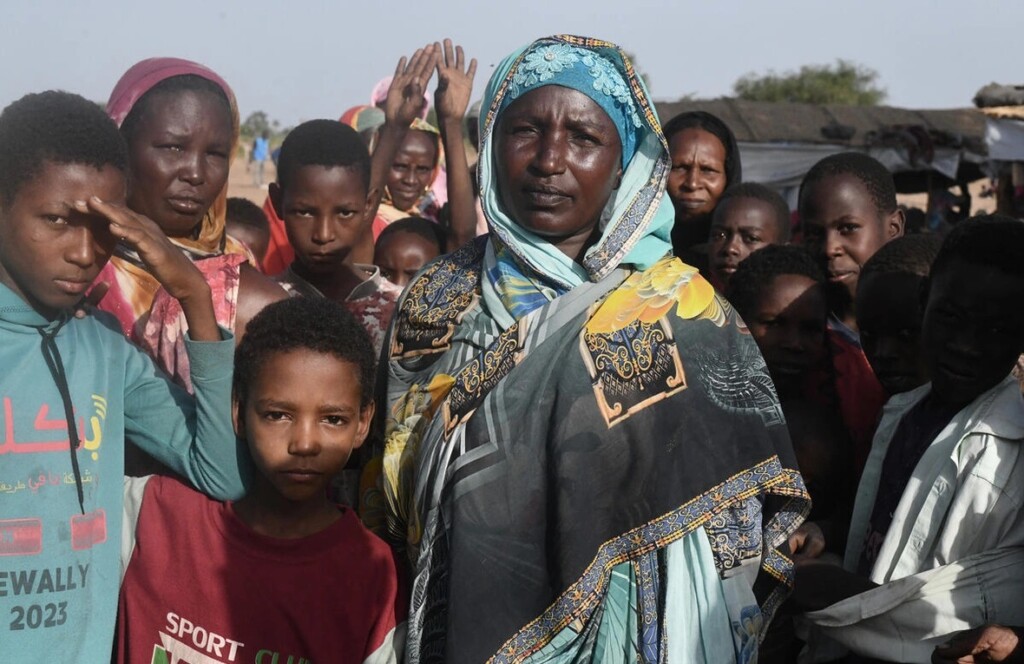Aid delivery in Sudan faces bureaucracy and security challenges

Sudanese refugees wait to be registered after crossing the border into the Central African Republic (Photo: Xavier Bourgois / UNHCR)
In Sudan, the quest to provide essential aid to those in need is riddled with challenges, including bureaucratic obstacles and insecurity. A conference on Sudan is set to be held in the Egyptian capital Cairo in mid-November, to discuss the humanitarian crisis currently facing the country from several key aspects.
The UN Office for the Coordination of Humanitarian Affairs (OCHA) in Sudan sheds light on difficulties faced in August and September in its Humanitarian Access Situation Report issued on Monday.
OCHA reports that there were about 200 pending visa applications for international staff during these two months, hampering the swift deployment of aid personnel*. This delay exacerbates an already critical situation as half of Sudan’s population, some 25 million people, require humanitarian assistance and protection.
Despite these hurdles, access and civil-military negotiations did yield some success, the report says. In August, 62,546 metric tonnes (equivalent to 1,381 lorries) of relief items were delivered to displaced communities. September saw an additional 36,988 metric tonnes (840 lorries) of aid reaching those in need. However, these achievements were not without setbacks, as a planned trip to deliver 786 metric tons (21 lorries) to Kordofan and Darfur had to be cancelled due to insecurity concerns.
The report highlights the crucial role played by cross-border assistance from Chad, which complemented efforts within Sudan to aid the people of Darfur. In September, 47 trucks successfully transported a total of 1,217 metric tonnes of vital humanitarian supplies.
“However, a number of operational obstacles remain that impede a rapid scale-up of aid from reaching those in need, including: operating in Sudan poses a high risk, as seen through the 20 aid workers killed this year. Violence against humanitarian personnel and assets continues, including looting of aid trucks, offices and drivers that curtail the capacity of the humanitarian organisations”, the report states.
Cairo conference
A conference on the humanitarian situation in Sudan, the Sudan Humanitarian Crisis Conference, is scheduled to be held in Cairo on November 18-20. According to the announcement, the conference will tackle the issues of social protection, food security, the impact of the conflict on the health system, gender-based violence, and issues of “coordination, localisation, and logistics of humanitarian work, including access and administrative difficulties”.
The director of the Norwegian Refugee Council in Sudan, William Carter, said on his X page (formerly Twitter) that this conference is “not a pledging conference”, but rather “an opportunity to re-model how aid works, an opportunity for the international system to really try to align and support with local priorities, and mostly a moment to explore how to do much better and at scale for millions of people across the country in humanitarian need.”
Sudan currently grapples with the largest displacement crisis in Africa, Carter said, compounded by famine-like conditions. The collapse of healthcare, education, and banking systems, along with systematic issues like rape, further exacerbates the crisis.
The UN Children’s Fund (UNICEF) and the World Health Organisation (WHO) have warned that 10,000 children may die by the end of this year due to disarray in health services.
Jeddah talks
Martin Griffiths, UN Emergency Relief Coordinator and Under-Secretary-General for Humanitarian Affairs, welcomed the resumed Jeddah talks, which focus on the safe provision of aid.
He lauded the Jeddah platform’s focus on humanitarian aid and urged the Sudanese authorities, specifically the SAF and the RSF, to “break the bureaucratic logjam” and “fully adhere to international humanitarian law.
“In light of the colossal humanitarian crisis in Sudan, my office, the UN Office for the Coordination of Humanitarian Affairs, will facilitate the humanitarian track of these negotiations”, Griffiths said in a statement on Sunday.
Darfur Regional Governor Minni Minawi on Sunday praised the joint efforts of donors, particularly Saudi Arabia, as well as the Darfur Joint Force in granting and delivering 74 truckloads of food and medicine to the Darfur region, “as they are operating in very harsh conditions”.
Refugees in CAR
In the neighbouring Central African Republic (CAR), new Darfuri refugees in the Samounja camp are facing dire conditions. They complain of not receiving any food for two months, lack of clean water, and the spread of malaria.
“Urgent medical care and medicines are desperately needed, as these refugees were displaced from El Radoom in South Darfur due to security concerns”, Adam Mohamed, a Sudanese camp resident, told Radio Dabanga.
An estimated 15,000 Sudanese have sought refuge in CAR due to the war, mostly from South Darfur, according to the UN High Commissioner for Refugees (UNHCR).
* Under the regime of President Omar Al Bashir (1989-2019), Sudan’s then infamous Humanitarian Aid Commission (HAC) was mostly staffed by security officers who frequently denied access to INGOs and often treated foreign aid workers as western spies.











 and then
and then